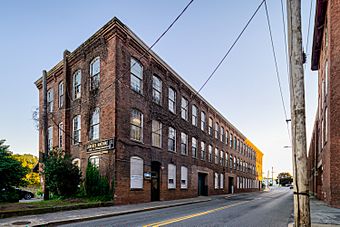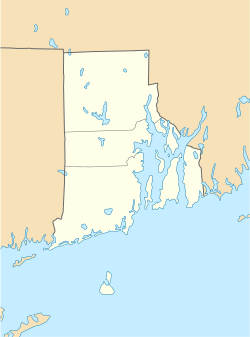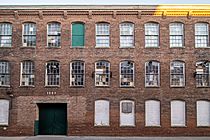Jenckes Spinning Company facts for kids
Quick facts for kids |
|
|
Jenckes Spinning Company
|
|
 |
|
| Location | Weeden, Barton, Pine, Lily Pond & Conant Sts., Pawtucket, Rhode Island |
|---|---|
| Area | 8 acres (3.2 ha) |
| Built | 1883 |
| NRHP reference No. | 100002059 |
| Added to NRHP | January 25, 2018 |
The Jenckes Spinning Company was a very old factory in Pawtucket, Rhode Island. It made fabric, like cotton cloth and material for car tires. This factory was built between 1883 and 1919.
In the 1910s, it was the biggest employer in Pawtucket, meaning it gave the most jobs. The factory stopped making things in 1933. Because it is an important old building, it was added to the National Register of Historic Places in 2018.
What did the Jenckes Spinning Company look like?
The Jenckes Spinning Company factory is about 0.5 miles (0.80 km) west of downtown Pawtucket. It sits on 8 acres (3.2 ha) of land. The factory area has nine buildings. Seven of these buildings are important because of their history.
All the buildings are made of brick. This was a common way to build textile mills in the late 1800s and early 1900s. The buildings are different heights, from one to six stories tall. One cool part of the factory is the "sawtooth roof" on the weaving sheds. These roofs look like the teeth of a saw.
How did the Jenckes Spinning Company start?
In 1872, a man named Edwin Jenckes started a company. He was already good at supplying tools to other fabric makers. He teamed up with Nathaniel Hicks, who made textiles. Their first goal was to make special parts for textile machines called "ring travelers."
In 1883, the company changed its name to "E. Jenckes Manufacturing Company." They bought some land where the factory now stands. The very first buildings were built that year. However, these first buildings were taken down in 1915-1916.
The company was good at making machine parts. Soon, they started making fabric themselves. In the 1910s, they made a strong cotton fabric. This fabric could be dipped in rubber and used for car tires. The company was later bought by other businesses. It closed down in the 1930s. After that, the city bought the land and divided it for other uses.
 | Toni Morrison |
 | Barack Obama |
 | Martin Luther King Jr. |
 | Ralph Bunche |




